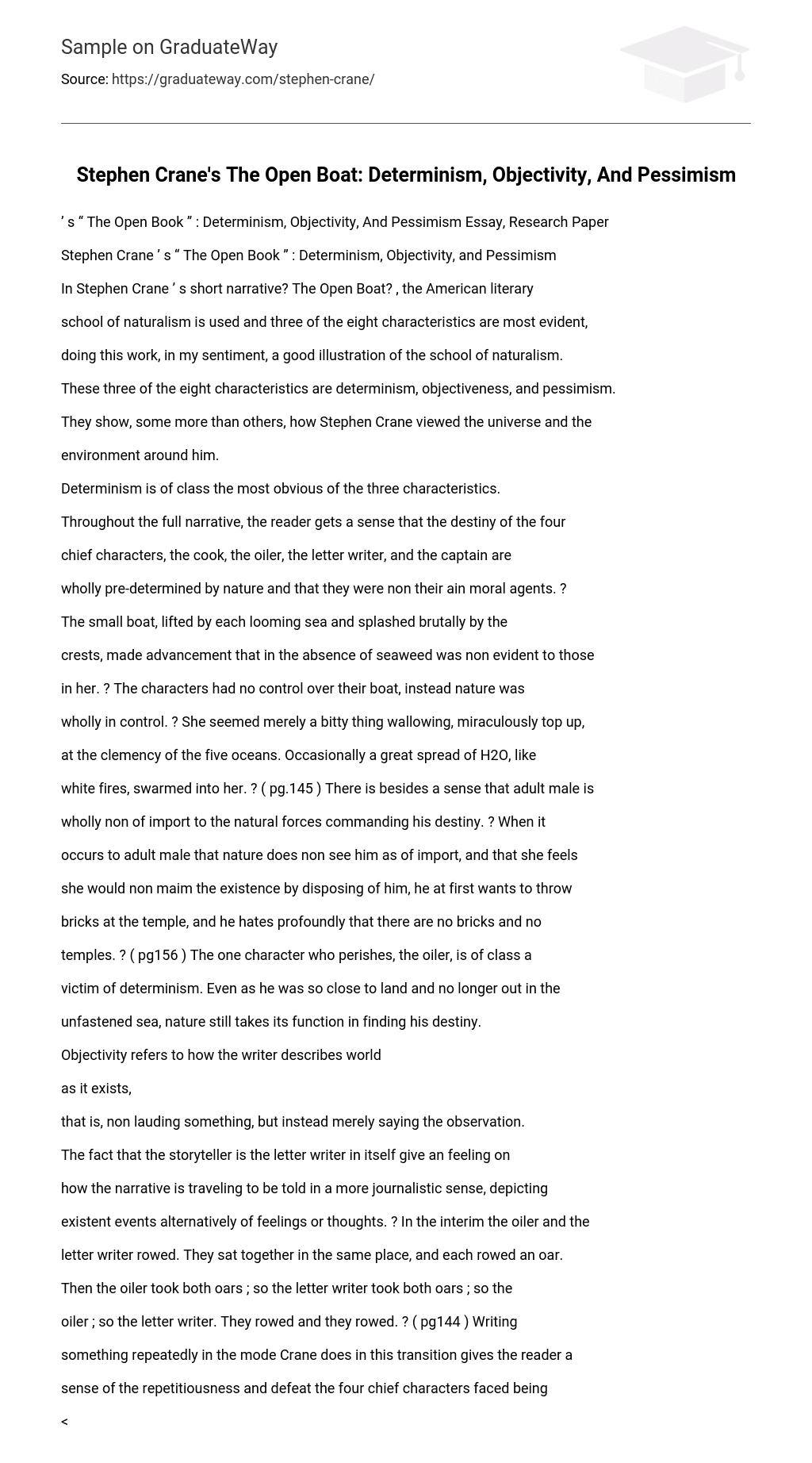In Stephen Crane ’ s short narrative The Open Boat, the American literary school of naturalism is used and three of the eight characteristics are most evident, doing this work, in my sentiment, a good illustration of the school of naturalism. These three of the eight characteristics are determinism, objectiveness, and pessimism. They show, some more than others, how Stephen Crane viewed the universe and the environment around him.
Determinism is of class the most obvious of the three characteristics. Throughout the full narrative, the reader gets a sense that the destiny of the four chief characters, the cook, the oiler, the letter writer, and the captain are wholly pre-determined by nature and that they were non their ain moral agents. The small boat, lifted by each looming sea and splashed brutally by the crests, made advancement that in the absence of seaweed was non evident to those in her. The characters had no control over their boat, instead nature was wholly in control. She seemed merely a bitty thing wallowing, miraculously top up, at the clemency of the five oceans. Occasionally a great spread of H2O, like white fires, swarmed into her. ( pg.145 )
There is besides a sense that adult male is wholly non of import to the natural forces commanding his destiny. When it occurs to adult male that nature does non see him as of import, and that she feels she would non maim the existence by disposing of him, he at first wants to throw bricks at the temple, and he hates profoundly that there are no bricks and no temples. ( pg156 )
The one character who perishes, the oiler, is of class a victim of determinism. Even as he was so close to land and no longer out in the unfastened sea, nature still takes its function in finding his destiny. Objectivity refers to how the writer describes world as it exists, that is, non lauding something, but instead merely saying the observation.
The fact that the storyteller is the letter writer in itself give an feeling on how the narrative is traveling to be told in a more journalistic sense, depicting existent events alternatively of feelings or thoughts. ? In the interim the oiler and the letter writer rowed. They sat together in the same place, and each rowed an oar. Then the oiler took both oars ; so the letter writer took both oars ; so the oiler ; so the letter writer. They rowed and they rowed. ( pg144 )
Writing something repeatedly in the mode Crane does in this transition gives the reader a sense of the repetitiousness and defeat the four chief characters faced being lost out at sea. Pessimism, in my sentiment, is evident throughout the full narrative. Although the four work forces do hold the will to last, it ever seems as if nature is ever playing the most of import function.
I am traveling to be drowned – if I am traveling to be drowned – if I am traveling to be drowned, why in the name of the seven huffy Gods who rule the sea, was I allowed to come therefore far and contemplate sand and trees. This transition is said non one time, but twice in the short narrative, beef uping the fact that a sense of pessimism is present throughout the narrative while besides showing the choler the characters feel toward the of all time present destiny of nature.
The full narrative in itself is a portrayal non of the struggle between adult male and nature, but instead the consequence and control nature has on human destiny, beef uping the realistic thoughts and positions through this narrative of four stranded work forces. The fact that the moving ridges, the tides, the freezing H2O and all the other features of the commanding force are of all time present, do, in my sentiment, the sea the most of import character in The Open Boat, the four work forces are merely the manner in which this is brought through to the reader.





